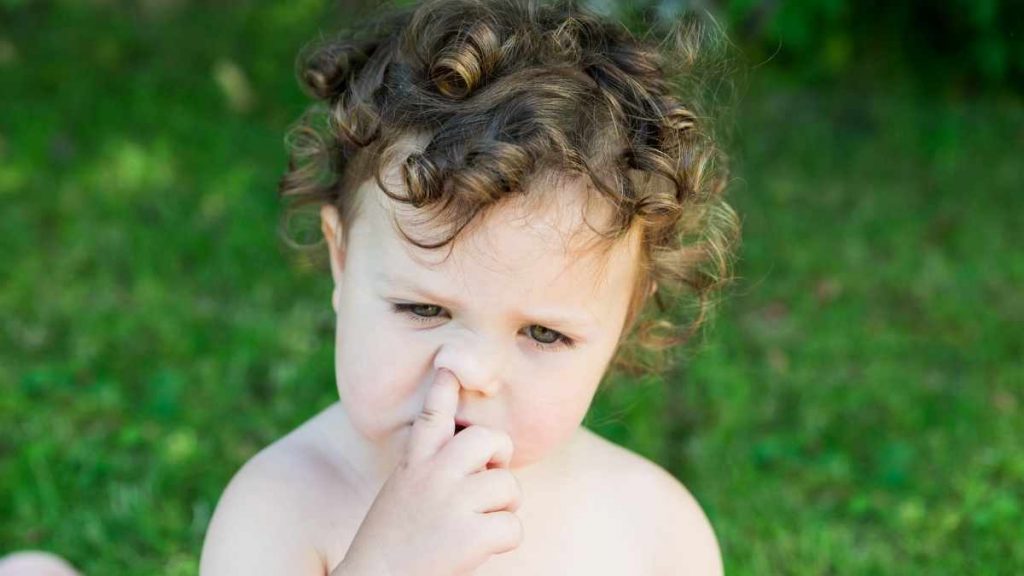Why does he do it? What can I do to stop him?
One of the most ingrained habits among children, especially the youngest, is putting their finger in their nose, picking it, and then eating the snot they extract.
They do it instinctively and naturally, oblivious to the disgust that this habit usually provokes in adults.
If your little one has this habit, you will probably worry about it and teach him not to do it, not only because of the negative connotations that this action has at a social level but also for his health.
Here are some tips that could help him to stop this habit.
Why do children stick their fingers up their noses and then eat boogers?

They uncover their hands and feet and then the rest of their body until they run into their nose. That little bump sticking out of their face with two tiny holes is very intriguing and accessible, so it’s normal for them to be curious to explore it.
First, they will stick their little finger in and poke around, but soon they will discover that there are boogers inside that they can pull out, manipulate and even eat, even though most adults find it disgusting.
For many experts, this behavior is inherited from our primate ancestors, so it is instinctive and natural for the young child.
As the child grows up, he will realize that it is a habit with negative social connotations associated with poor education and lack of hygiene. It also tends to arouse a feeling of disgust among those around him.
So little by little, they will learn not to do it (although we know that there are cases in which the habit continues even in adulthood).
Is it bad for your health to eat snot?

Since nasal secretions trap viruses and bacteria that try to penetrate from the outside through the nostrils, it is easy to think that they could get sick if the child eats them.
However, some hypotheses argue that eating boogers may benefit the immune system.
But what can happen when you stick your finger in your nose can cause bleeding or lesions that hurt and even become infected.
In addition, we must not forget that our hands come into daily contact with hundreds of surfaces, so if we do not wash them frequently, it is easy to introduce diseases into our bodies through the nostrils.
Tips for the child to give up this bad habit

If it is not usual for the child to pick his nose or eat snot, the best thing to do is to ignore his behavior since it is probably something completely temporary that will disappear on its own in a short time.
But if nose-picking starts to become a regular occurrence, here are some tips that may help your child to break the habit:
- Be patient. As we said, this habit is natural among young children, and, in addition, it is elementary for them to copy each other, so it will take time for them to learn not to do it.
- Don’t scold or punish him for it, and don’t call his attention to it in front of people.
- To alert him to this habit when other people are present, you can agree on a code word that only you understand. This way, you can warn him to stop without feeling overwhelmed or embarrassed by his surroundings.
- We must banish from our vocabulary labels towards the child (dirty, rude, filthy.) and ironic expressions (“you’re going to make oil,” “if you keep it up, you’ll end up getting your whole hand through your nostril”…), as they can deeply damage his self-esteem.
- How often do we order our child not to touch his nose without giving him a reason not to do so? Calmly explaining to the child why he should not put his finger in his nose will make him aware of the problems that this habit can cause and, therefore, help avoid it.
- If you have noticed that your child puts his finger up his nose out of simple boredom (some children do it while watching TV, for example), divert his attention by asking him to put his hands in his pockets or giving him an object to hold in his hands. In other words, offer them alternatives to keep their hands busy and avoid putting them up their nose.
- Keep his nose always clean, encouraging him to blow his nose frequently (especially if he is congested) and even apply a few drops of saline solution. Remember that children often pick their nose because they feel it is particularly dry or a runny nose bothers them.
- Make sure your child always carries a pack of tissues in his pocket, and teach him how to use them to remove snot from his nose hygienically and discreetly.
- Keeping your child’s room at the proper humidity level will also help keep his nose from drying. Ask your pediatrician about using a room humidifier.
- Suppose your child is older and continues to do it, or you observe that it is a habit that is too frequent and persists over time. In that case, it may be advisable to seek professional help because sometimes it hides an anxiety problem that requires special attention.





